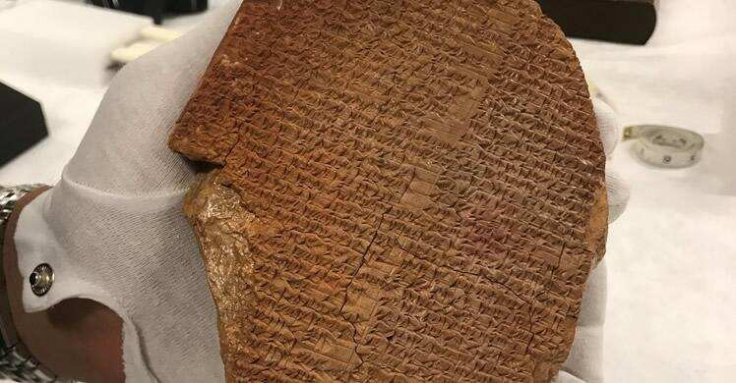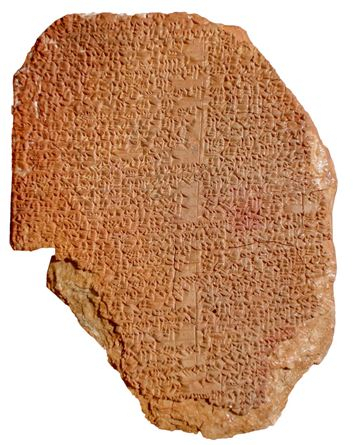The Gilgamesh Dream tablet, an ancient tablet part of the Epic of Gilgamesh that was acquired illegally, housed in the Museum of the Bible in Washington D.C, will be returning to its original home in Iraq. The ancient clay tablet was discovered in 1853 in Assyrian ruins in northern Iraq.
The five-by-six-inch tablet was seized by the Federal agents from the Museum of the Bible, sponsored by the arts and crafts chain Hobby Lobby, in 2019. In a civil action filed on Monday, Brooklyn US Attorney Richard Donoghue's office asked for the 1,674,000 artifacts to be handed over to the Iraqi government.
The Legend of Gilgamesh Dream Tablet

Considered to be the world's oldest work of literature, dating back to 1600 BC, Gilgamesh Dream Tablet is part of the epic Sumerian poem of Gilgamesh written on it. It is written in Cuneiform, or Sumero-Akkadian cuneiform, one of the earliest systems of writing, invented by Sumerians in ancient Mesopotamia. Most scholars believe that the origins of the poem lie in the legends of the Sumerian ruler Gilgamesh, the fifth king of the city of Uruk, who reigned in the middle of the third millennium B.C.

The Dream tablet is the fourth tablet in 12-tablet series. The clay Tablet talks about the part of the Gilgamesh epic in which the protagonist describes his dreams to his mother. The protagonist's mother interprets the dreams as foretelling the arrival of a new friend. She tells her son, "You will see him and your heart will laugh."
New York Post quoted Donoghue saying: "Whenever looted cultural property is found in this country, the United States government will do all it can to preserve heritage by returning such artifacts where they belong. In this case, a major auction house failed to meet its obligations by minimizing its concerns that the provenance of an important Iraqi artifact was fabricated, and withheld from the buyer information that undermined the provenance's reliability."
Trailing Gilgamesh Dream Tablet
In the lawsuit, the prosecutors alleged that an unnamed antiquities dealer purchased the tablet along with a number of other items from another dealer in London in April 2003. The tablet exchanged hands again in 2007 when the dealer sold it for $50,000 to another buyer.
The dealer provided the buyer with a fake provenance letter, which falsely claiming the tablet's legitimacy stating that it was bought at an auction in 1981, much before the laws restricting the import of Iraqi artifacts were passed. It was again purchased by Hobby Lobby Stores, for $1.6 million, from an unnamed international auction in 2014.
'However, in 2017, when a museum curator tried to extract some information about the tablet's origin, the auction house failed to disclose details about how they had obtained the artifact and withheld the false provenance letter, which it knew would not hold up to "scrutiny in a public auction," prosecutors stated in the court papers.
In 2017, Hobby Lobby was fined $3 million after federal authorities found out that it bought thousands of artifacts that had been smuggled out of Iraq for the museum, the NBC News reported. President of Hobby Lobby and museum's chairman Steve Green, following the 2017 settlement, had called the purchases a "regrettable" mistake adding that the company should have "exercised more oversight and carefully questioned how the acquisitions were handled."
In a statement issued, Spokeswoman Charlotte Clay maintaining said that they support the Department of Homeland Security's efforts to return this Gilgamesh fragment to Iraq. "The museum, before displaying the item, informed the Embassy of Iraq on Nov. 13, 2017, that it had the item in its possession but extensive research would be required to establish provenance," the museum said in a statement.








